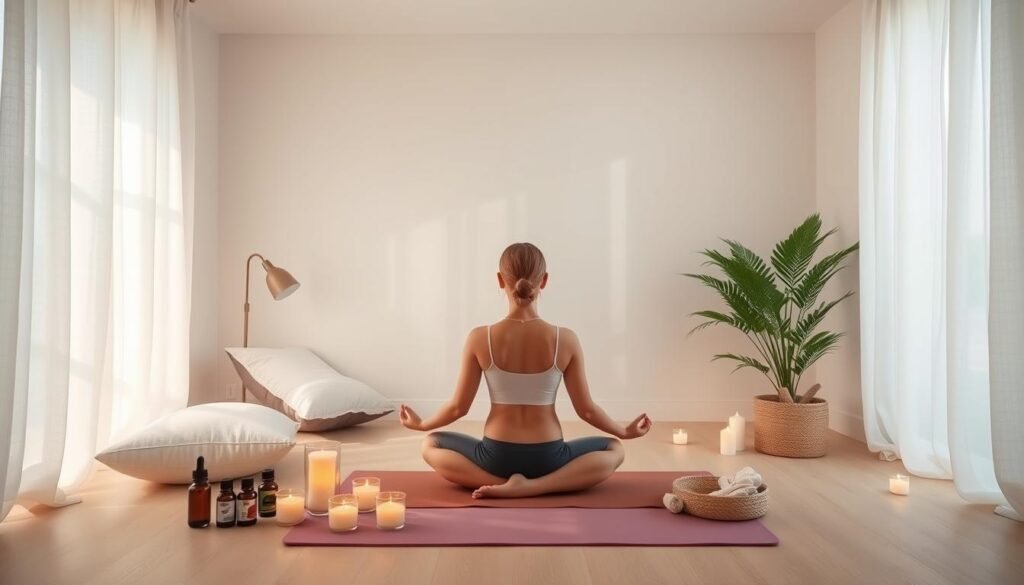Shocking research reveals that about 31.1% of U.S. adults will battle anxiety disorders at some point. This huge number shows why it’s vital to know how to cope with stress vs anxiety. Millions deal with these tough feelings every day. Knowing the difference between stress and anxiety is key. This knowledge helps in finding good ways to manage stress and anxiety, making mental health better.
Chronic stress can harm your health, causing high blood pressure and sleep problems. It’s important to look into various mental health strategies. This guide will give you effective techniques for handling stress and anxiety. You will learn about what they are, their symptoms, and how to cope. With this info, you can take on your mental health challenges better.
Key Takeaways
- Understanding the difference between stress and anxiety is crucial for effective management.
- Chronic stress can have serious health consequences.
- Approximately 31.1% of U.S. adults will experience anxiety disorders in their lifetime.
- Effective stress management techniques and anxiety coping mechanisms can improve overall well-being.
- Identifying triggers helps in understanding personal stress and anxiety responses.
Understanding Stress and Anxiety
It’s crucial to understand the difference between stress and anxiety. Stress comes from outside pressures like deadlines or big changes in life. It can happen now and then or last a long time. Anxiety, though, often starts with stress. Yet it sticks around even when there’s no clear danger, leaving people in constant worry.
Defining Stress
Stress happens when we face tough situations. This could be due to work stress, family duties, or big changes. Our bodies react with changes like a faster heartbeat and higher blood pressure. If we don’t tackle chronic stress, it can lead to tiredness, headaches, and stomach issues. It’s key to understand this for taking care of our mental health.
Defining Anxiety
Anxiety shows up as ongoing fear or worry when there’s no obvious reason. Those dealing with it might feel tense, have quick thoughts, and suffer from tight muscles or sleep problems. This state can cause various health problems. It’s important to tell stress and anxiety apart to handle them right. Getting help and using strategies like deep breathing or writing down thoughts can help manage anxiety.
| Aspect | Stress | Anxiety |
|---|---|---|
| Definition | Physical or mental response to external causes | Persistent worry without immediate threats |
| Symptoms | Fatigue, headaches, high blood pressure | Excessive worry, muscle tension, sleep disturbances |
| Occurrence | Occasional or prolonged exposure to stressors | Can exist without specific triggers |
| Management Strategies | Relaxation exercises, exercise, healthy eating | Journaling, seeking support, psychotherapy |
What Are the Symptoms of Stress and Anxiety?
It’s vital to know the symptoms of stress and anxiety. This helps in spotting signs that need help. While they share some symptoms, stress and anxiety have their unique signs.
Common Symptoms of Stress
Stress can affect us physically and emotionally. Some common signs of stress are:
- Aches and pains
- Changes in sleep patterns
- Emotional withdrawal
- Fatigue
- Increased alcohol or drug use
- Headaches and muscle tension
- Irritability and racing thoughts
Stress can lead to severe health problems like heart disease and depression. Once the cause of stress is gone, the physical signs often improve.
Common Symptoms of Anxiety
Anxiety brings its own set of problems. The usual signs of anxiety include:
- Excessive worry and fear about daily life
- Difficulty concentrating
- Feelings of impending doom
- Panic attacks with intense fear
- Avoidance of social situations due to fears of judgment
- Physical symptoms such as rapid heartbeat or sweating
Anxiety symptoms can stick around even without stressors. It can lead to depression and substance misuse. To learn the differences between these conditions, check out stress and anxiety.
| Type | Common Symptoms |
|---|---|
| Stress | Aches, fatigue, irritability, headaches, emotional withdrawal |
| Anxiety | Excessive worry, difficulty concentrating, panic attacks, social avoidance |
Differences Between Stress and Anxiety
Knowing how stress and anxiety differ is key to handling them well. Stress usually comes from known problems, while anxiety doesn’t need a clear reason to show up. This fact changes how we deal with each issue.
Triggers of Stress
Stress is linked to specific events or issues we face. Things that can cause stress include:
- Work-related pressures such as deadlines or workload
- Family responsibilities and conflicts
- Health concerns or medical conditions
- Significant life changes like moving or starting a new job
- Financial worries or instability
Stress often goes away when we fix the problem causing it. This is unlike anxiety, which can stick around without a clear cause.
Characteristics of Anxiety
Anxiety involves a wider set of feelings, usually including:
- Persistent worry that proves hard to control
- Feelings of dread or impending doom
- Physical symptoms such as rapid heartbeat, sweating, or dizziness
- Restlessness and trouble concentrating
The signs of anxiety can stay even if the stressor is gone. For example, you might still feel anxious without an obvious reason. This shows how anxiety is different from just reacting to stress.
It’s important to recognize these differences. Since stress and anxiety affect people differently, personalized ways to manage them are needed. To learn more about these issues, check out this detailed guide.
How to Cope with Stress vs Anxiety
Understanding how to manage stress and anxiety is key for good mental health. Both conditions can cause symptoms like too much worry, muscle tightness, and quick irritation. Stress usually comes from a specific cause and doesn’t last long. Anxiety, on the other hand, sticks around without a clear reason, affecting things like social life and job performance.
To handle these feelings better, adopting effective methods is crucial. Getting enough sleep and exercising are important for dealing with stress. For example, aiming to walk 10,000 steps a day is a common goal for staying fit. Also, just five minutes of walking outside can make you feel happier.
Practicing mental health activities such as meditation and yoga helps too. These activities not only help you relax but also clear your mind. Cognitive-behavioral therapy (CBT) is known for its success in treating anxiety by changing negative thoughts.
It’s vital to notice when symptoms are serious. Long-term stress can harm your immune system, leading to getting sick more often. If anxiety gets too intense, it might cause persistent thoughts of harming oneself, which means it’s time to seek professional advice. Using a mix of these methods can build your defense against stress and anxiety.

Stress Management Techniques
Using the right stress management techniques can really help you feel better. It’s good to get moving and eat right. These steps help lower stress and make your mind clearer.
Physical Activity
Moving around is a great way to handle stress. Try to be active for 2½ hours a week at a moderate pace. Or, go for 1¼ hours with more intense workouts. Aim to exercise three to five times a week for the best results.
If you can, exercise for 15 to 20 minutes every day. This is better than long sessions now and then. If you’re not used to being active, give yourself four to eight weeks to get into it. You’ll find you move better and feel more coordinated.
Healthy Eating Habits
Eating well also helps with stress. A diet full of good stuff like fruits, veggies, grains, and lean proteins is key. Cut back on sugar and bad fats. Learning the 4 As of handling stress—avoid, alter, accept, or adapt—is helpful too.
It’s important to accept things you can’t change. Try to change how you react to stress. This makes handling stress easier.
| Technique | Description | Frequency |
|---|---|---|
| Physical Activity | Engaging in moderate to vigorous exercises to reduce stress hormones and increase endorphins. | 3-5 times per week |
| Healthy Eating | Incorporating a balanced diet to support physiological and psychological wellness. | Daily |
Trying different ways to manage stress helps you find what fits you best. Being active and eating well reduces stress. This also keeps you healthy in the long run.
Anxiety Coping Mechanisms
Anxiety shows up in many ways, but there are good ways to handle it that make us feel better. Writing in a journal helps us share our thoughts and feelings. It’s a way to deal with emotions positively. Talking to friends or family gives us support. It makes us feel less alone. This kind of support shields us from everyday stress.
Practices like mindfulness are key in dealing with anxiety. Deep breathing or meditation keeps us focused on now, easing worry. Knowing what makes our anxiety worse is important. This helps us create better coping strategies that are just for us.
Staying active is great for our minds. Exercise releases endorphins, lifting our mood. Eating well helps our overall health, which affects our mood and stress. Sleeping well is crucial for clear thinking and staying strong.

“Coping involves adjusting to stressors, requiring greater effort and energy than daily routines.”
Below is a table showing different ways to cope with anxiety and their benefits:
| Coping Mechanism | Benefits |
|---|---|
| Journaling | Helps in expressing emotions and reduces anxiety levels. |
| Mindfulness Practices | Enhances focus and lowers stress through present-moment awareness. |
| Physical Exercise | Boosts mood and lowers anxiety by releasing endorphins. |
| Healthy Eating | Supports overall health and influences emotional regulation. |
| Building Support Networks | Provides emotional buffers and reduces feelings of isolation. |
Using these coping ways can lead to a calmer mind. Focusing on what works for us personally helps us be more resilient against anxiety.
Mental Health Strategies to Combat Stress
Managing stress well means using mental health strategies that build resilience. Mindfulness and cognitive-behavioral therapy are key. They help improve well-being.
Mindfulness Practices
Mindfulness links us to the now, increasing awareness and calm. Techniques like deep breathing, meditation, and yoga help relax and reflect. Regular practice can lessen stress’s grip on us.
Cognitive-Behavioral Therapy
Cognitive-behavioral therapy tackles stress from harmful thoughts. It guides people to spot, question, and change negative beliefs and actions. Learning to shift thoughts can lower stress and boost mental health.
Relaxation Exercises for Stress Relief
Relaxation exercises are a great way to fight stress. They make you feel better, improve your focus, and help you deal with daily challenges better. When you practice deep breathing and visualization, you can control stress and feel more relaxed.
Deep Breathing Techniques
Deep breathing is simple but very effective. It makes your heart rate slow down and lowers your blood pressure, which reduces stress. You just need to breathe in deeply through your nose and breathe out slowly through your mouth. Doing this helps calm your mind and is good for your digestion too.
It also helps you think clearer. If you keep practicing, you’ll get better at dealing with stress. This makes deep breathing a key skill for managing stress.
Visualization Exercises
Visualization exercises let you take a mental break from stress. Imagine peaceful places or happy moments, and you can relax your muscles and ease pain. This method brings calm and peace, which can help you sleep better and feel less angry or frustrated.
With practice, you’ll become more aware of how you respond to stress. This awareness helps you handle stress better.

Identifying Your Stress Triggers
Knowing how to find what triggers your stress is key to handling it well. Stress comes from many sources. Recognizing what situations make you stressed can help you deal with them.
Big life changes often bring stress. This includes getting sick, losing someone, money problems, or big changes like moving. Daily pressures also cause stress. This can be from a test, work issues, or small arguments.
Remember, everyone reacts to stress differently. What overwhelms one person might not bother another at all. This is why knowing what triggers your stress is so important.
Doctors might use questionnaires to understand your stress better. Figuring out what stresses you can shape your treatment. This may involve changing your lifestyle, talking to someone, or learning ways to manage stress. If you don’t handle stress well, it could hurt your health, like causing high blood pressure.
Learning to manage your stress triggers is great for your mental health. It also makes you stronger. Knowing how you respond to stress lets you build better habits. This helps avoid bad ways of dealing with stress that harm your health.
When to Seek Professional Help
Knowing when to get help is key to handling anxiety and stress. There are signs that show it’s time for professional help. For example, if daily life is getting too hard. Or, if someone feels hopeless or lacks motivation a lot.
Studies show that stress can lead to anxiety disorders. People who can’t deal with stress might face more anxiety issues. One sign you might need help is if sleeping becomes hard. Getting enough sleep is crucial for managing stress and staying mentally healthy.
It’s important to set healthy boundaries to avoid too much stress. Some conditions, like generalized anxiety disorder or panic disorder, need professional care. If anxiety doesn’t go away after six months and messes with daily tasks, it’s smart to get help.
Cognitive Behavioral Therapy (CBT) is very good for treating anxiety. Group therapy is also helpful, especially for social anxiety, by creating a safe place to interact. Medications like SSRIs and SNRIs are used with therapy for tougher cases. If you’re thinking about your mental health, getting help is a step toward a better life. Learn about common anxiety symptoms here.
Self-Care Routines for Managing Stress and Anxiety
Self-care routines play a vital role in managing stress and anxiety. They help individuals feel better mentally. Two key steps are setting up a sleep routine and reducing caffeine and alcohol use.
Establishing a Sleep Routine
Having a regular sleep routine helps with mental clarity and emotional strength. Most adults need 7 to 9 hours of sleep to function well. Not getting enough sleep can affect your mood, energy, and overall health.
Doing relaxation exercises before bed, like deep breathing or gentle yoga, improves sleep. Those with a regular sleep pattern handle stress better. Writing in a sleep journal helps find patterns for the best rest.
Limiting Caffeine and Alcohol
Cutting back on caffeine and alcohol is important for managing anxiety. Both can make anxiety worse and mess up your sleep. People who drink less caffeine often feel less anxious.
Being mindful of alcohol use can improve emotional health. Mental health professionals suggest reducing these substances for better self-care. Choosing healthier options helps with relaxation and happiness, reducing stress.
For more information on self-care routines, visit this resource. It offers more evidence-based tips and suggestions.
Conclusion
It’s really important to know the difference between stress and anxiety. This article gave us some great ways to handle both. Knowing what makes you stressed or anxious is the first step to feeling better. Once you know, you can plan how to deal with it.
Doing things like exercising, being mindful, or getting help from a pro can help a lot. Remember, stress and anxiety are different for everyone. So, you might need to try different things to see what works best for you.
Dealing with stress and anxiety is very personal. But the ideas we talked about can help. By using these strategies and asking for help when you need it, you can improve your life. You can feel more in control and happier overall.